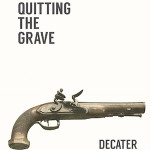Conqueror Of The Old Northwest

Well, it has finally happened. The email responses to Dance With Sunflowers have become so voluminous, I can no longer keep up. So I have decided to start a new feature of my blog where I answer reader questions.
Let’s call it the Weekly Mail Blog.
Email #1
Dear Doc,
Where have you been? You use to post several times a week. But it’s been months since your last post. What’s going on?
Missing you,
Holly Graham
Milwaukee, Wisconsin
Dear HG,
As much as I like blogging every day, there are other things I like just as much, like trips to the dentist or sentry duty. If I blog too often, I will be neglecting these other worthwhile pursuits, and I could end up as the next Wil Wheaton.
But rest assured that I will keep blogging as much as I can, when I am not busy doing other things I enjoy more.
The Good Doctor
_______
Email #2
Dear Doc,
I have been reading your blog, and I’ve been thinking, “Hey, it can’t be that hard. I should start a blog of my own.”
Any advice for a first time blogger? Is it even possible for a guy to start blogging without the backing of a huge corporation and unlimited resources?
Aggressively opinionated,
Roger Matthews
Coeur d’Alene, Idaho
Dear RM,
I’m sorry to say that most blogging sites require a master’s degree in one of the hard sciences and three letters of reference from people that don’t actually know you but will vouch for your forthrightness. As if that weren’t enough, you must also show proof of certificate from one of three fully accredited etiquette and good manners training programs.
Fortunately, several of the top universities now feature major opportunities in microcommunications. Early figures indicate 27% of graduates are able to secure at least part time blogging employment within the first six months.
The Good Doctor
_______
Email #3
Dear Doc,
Who’s your favorite historical figure?
Antiquated,
Jonas Abraham
Bucksport, Maine
Dear JA,
Benjamin Franklin was one of the Founding Fathers of the United States of America. A noted polymath, Franklin was a leading author and printer, satirist, political theorist, politician, scientist, inventor, civic activist, statesman, soldier, and diplomat. As a scientist, he was a major figure in the Enlightenment and the history of physics for his discoveries and theories regarding electricity. He invented the lightning rod, bifocals, the Franklin stove, a carriage odometer, and the glass ‘armonica’. He formed both the first public lending library in America and first fire department in Pennsylvania. He was an early proponent of colonial unity, and as a political writer and activist he supported the idea of an American nation. As a diplomat during the American Revolution he secured the French alliance that helped to make independence of the United States possible.
Franklin is credited as being foundational to the roots of American values and character, a marriage of the practical and democratic Puritan values of thrift, hard work, education, community spirit, self-governing institutions, and opposition to authoritarianism both political and religious, with the scientific and tolerant values of the Enlightenment. In the words of Henry Steele Commager, “In Franklin could be merged the virtues of Puritanism without its defects, the illumination of the Enlightenment without its heat.” To Walter Isaacson, this makes Franklin, “the most accomplished American of his age and the most influential in inventing the type of society America would become.”
Franklin became a newspaper editor, printer, and merchant in Philadelphia, becoming very wealthy, writing and publishing Poor Richard’s Almanack and The Pennsylvania Gazette. Franklin was interested in science and technology, and gained international renown for his famous experiments. He played a major role in establishing the University of Pennsylvania and Franklin & Marshall College and was elected the first president of the American Philosophical Society. Franklin became a national hero in America when he spearheaded the effort to have Parliament repeal the unpopular Stamp Act. An accomplished diplomat, he was widely admired among the French as American minister to Paris and was a major figure in the development of positive Franco-American relations. From 1775 to 1776, Franklin was Postmaster General under the Continental Congress and from 1785 to 1788 was President of the Supreme Executive Council of Pennsylvania. Toward the end of his life, he became one of the most prominent abolitionists.
His colorful life and legacy of scientific and political achievement, and status as one of America’s most influential Founding Fathers, has seen Franklin honored on coinage and money; warships; the names of many towns, counties, educational institutions, namesakes, and companies; and more than two centuries after his death, countless cultural references.
And to answer you question, my favorite historical figure is George Rogers Clark.
The Good Doctor
Lyric of the Day:
Everything alive must die
Every building built to the sky will fall
Don’t try to tell me my
Everlasting love is a lie
Everlasting everything
Oh nothing could mean anything at all
Every wave that hits the shore
Every book that I adore
Gone like a circus, gone like a troubadour
Everlasting love for ever more
Oh I know this might sound sad
But everything goes both good and the bad
It all adds up and you should be glad
Everlasting love is all you have
Everlasting Everything
-Wilco
 Check out Decater's new novel, available now at Amazon. Plus, don't forget his earlier books: Ahab's Adventures in Wonderland and Picasso Painted Dinosaurs.
Check out Decater's new novel, available now at Amazon. Plus, don't forget his earlier books: Ahab's Adventures in Wonderland and Picasso Painted Dinosaurs.


